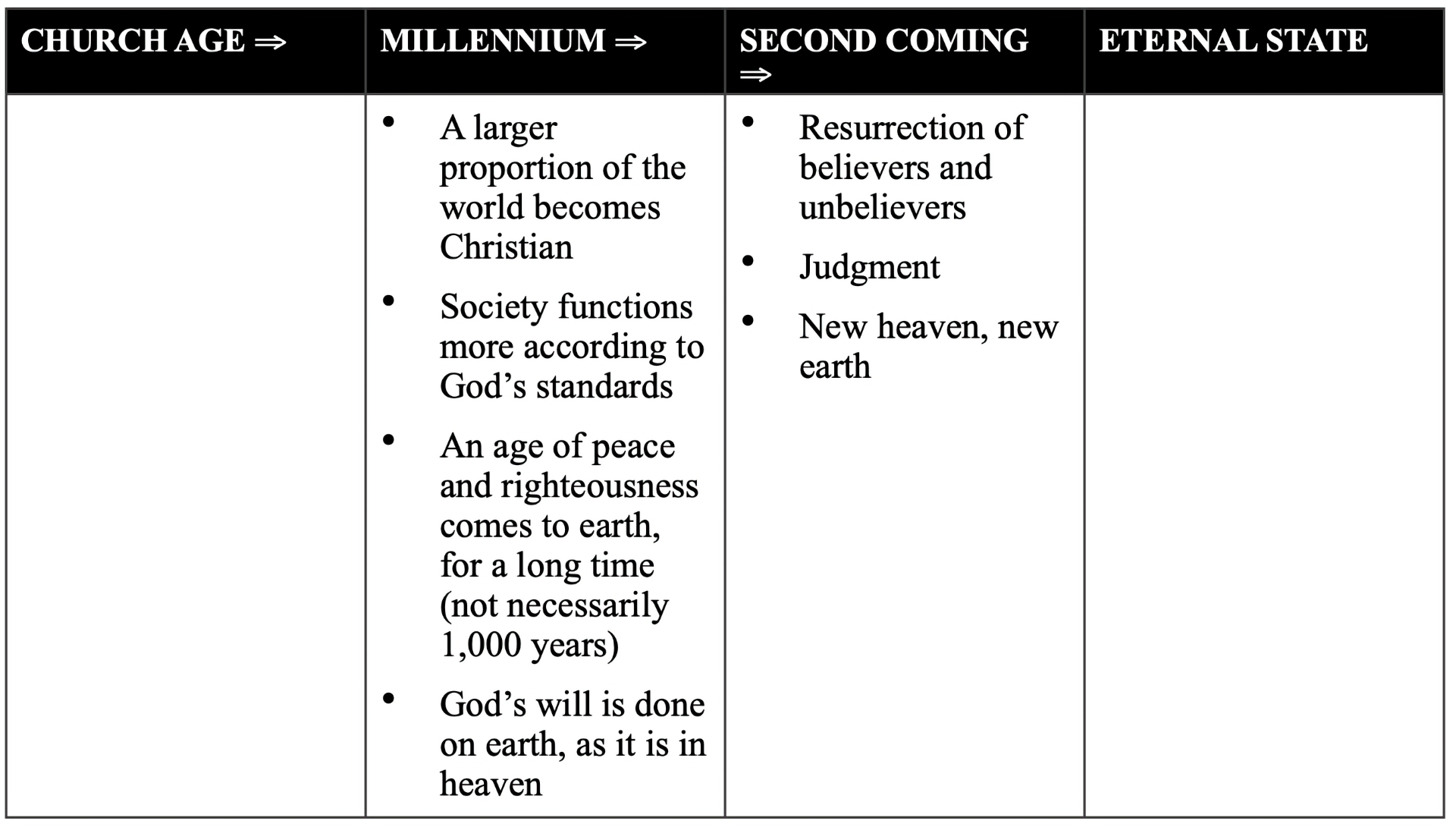Postmillennialism

Big Idea: Postmillennialism is a Christian belief that Christ will return after a period of Christian prosperity in which the church's influence will transform society through the gospel.
“There will come a time when in this world holiness shall be more general, and more eminent, than ever it hath been since Adam fell in paradise. (Thomas Brooks, The Crown and Glory of Christianity, 1662)

A Short History of Postmillennialism
- Postmillenialism is in one sense the historic position of the church since the days of St. Augustine. (Distinctions were not always made between amillennialism and postmillennialism until later in church history).
- In the fourth century, Christianity had achieved unprecedented political success. Emperor Constantine converted to Christianity in 312 AD. Christianity was granted tolerance within the Roman Empire and essentially became the official religion. The progress of the church throughout the entire world looked sure. The millennium was assumed to have begun.
- After the end of the first millennium of church history, postmillennialists were forced to revise some of their beliefs. The millennium was no longer viewed as a literal one thousand years, but as the whole of church history.
- In periods where the church appeared to be succeeding in its task of world evangelism, postmillennialism has experienced resurgence. For instance, in the latter part of the nineteenth century, the church experienced a period of great effectiveness in world missions and progress in social conditions.
- In the twentieth century, postmillennialism has not been a popular view because of world events.
What Postmillennialism Teaches:
- The kingdom of God is now being extended in the world through the preaching of the gospel and the saving work of the Holy Spirit.
- The world will eventually be Christianized. There will be a golden age of spiritual prosperity, characterized by uplifted social, economic, political, and cultural conditions.
- Not every person will be a Christian, and not all sin will be abolished, but evil will be reduced to negligible proportions. Christian principles will be the rule.
- The return of Christ will occur at the close of a long period of righteousness and peace, called the millennium.
- The Second Coming of Christ will be followed by the general resurrection, the general judgment, and the introduction of heaven and hell.
- The millennium will not be that different from today, in one sense. People will continue to marry, work, and lead normal lives. Christ will not be physically present on earth. However, the church will be more zealous and influential.
- An example of a postmillennial hymn is “Jesus Shall Reign.”
Arguments for Postmillennialism
- The Great Commission leads us to expect that the gospel eventually spread to the entire world. Given that Christ holds all power and promises to be with us as we fulfill our mission, we can expect the gospel to spread worldwide (Matthew 28:18-20).
- Jesus shared parables that illustrate the kingdom's growth and its eventual influence over the world (Matthew 13:31-33).
- Many verses speak of God redeeming the world (Psalms 47, 72, and 100; Isaiah 45:22-25; Zechariah 9:10; Hosea 2:23; Revelation 7:9-10).
- Angels and saints are described in Scripture as being hosts, myriads, an innumerable multitude, ten thousand times ten thousand (e.g. Luke 2:13; Isaiah 6:3; Revelation 5:11). Such language is never used to describe the lost. Heaven is described as being the next world, a great kingdom, a country, a city, whereas hell is pictured as being a comparatively small place: a prison, a lake, a pit (Luke 20:35; Matthew 5:3; Hebrews 11:16; 1 Peter 3:19; Revelation 19:20; 21:1, 8-16).
- Historically speaking, the world is becoming increasingly Christian. Even when the church is persecuted and oppressed, it is still growing. The Bible is available, in whole or in part, in the native tongue of 98% of the people of the world.
- Social conditions are improving. There is less slavery, polygamy, oppression of women and children, and poverty. Medical care has improved. Despite temporary setbacks, progress can be seen in almost every area of life.
Responses to Postmillennialism
- While the Great Commission speaks of Christ’s authority, it does not imply that Christ will use that authority to convert the entire world. It is simply another way of saying that Jesus, as God, is all-powerful.
- While these parables teach that God’s kingdom will gradually grow from something very small to something very large, it does not tell us the extent to which it will grow. For instance, the parable of the leaven does not tell us how much of the loaf contained leaven.
- Biblical data seems to indicate a great wickedness and a cooling off of the faith of many before Christ’s return (Matthew 24-25 – especially 24:21-30; 2 Thessalonians 2:3-4; 2 Timothy 3:1-5). Further, the Bible never teaches an earthly reign of Christ without his physical presence.
- The Bible teaches that relatively few will believe (Matthew 7:13-14; Luke 18:8).
- We have seen a decline in evangelistic and missionary success. In parts of the world, the percentage of practicing Christians is very small. Entire countries are closed to Christianity.
- The world is not becoming a better place. We see unprecedented levels of drug abuse, marital infidelity, pornography, homosexuality, rebellion against authority, superstition, materialism, greed, and falsehood.
- In addition, many passages teach that Christ could return at any time and that we must be ready (Matthew 24:42-44; 1 Corinthians 16:22; Hebrews 10:25; 1 Peter 4:7; 2 Peter 3:10; Revelation 22:20). This would seem to contradict the idea of a long period of time required for the millennium on earth preceding his return.
- Postmillennialists do not agree on the subject of the two resurrections of Revelation 20.
Other Articles in This Series
- Understanding the Millennium
- Part 1: End Times: Introduction and Amillennialism
- Part 3: Premillenialism
- Part 4: Coming to a Position
Download the entire series in a PDF:





